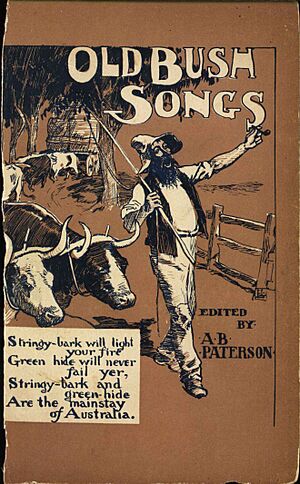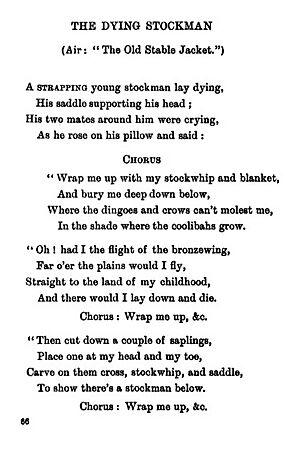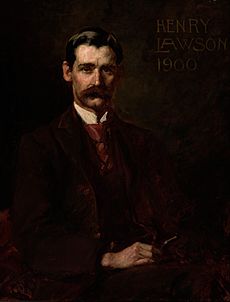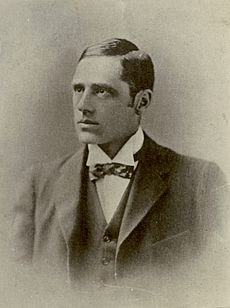Bush ballad facts for kids

The bush ballad, also called a bush song or bush poem, is a special kind of poetry and folk music from Australia. It tells stories about life, people, and nature in the Australian bush. Bush ballads often have simple rhymes. They can be funny or sad. The words used are colourful and very Australian. They tell exciting stories about bushrangers, droving cattle, droughts, floods, and life in the wild frontier. They also talk about the relationships between Indigenous people and other Australians.
The first ballads were made by British and Irish settlers and convicts. They brought folk music from their home countries. These songs were usually not written down. Instead, people shared them by singing and telling them to each other. Over the years, these ballads grew into a unique Australian style. They became very popular in the late 1800s and early 1900s. Australians felt these songs truly showed the "national spirit." Newspapers and magazines, like The Bulletin, used bush poetry to promote ideas like mateship (strong friendship), egalitarianism (everyone being equal), and standing up to unfair power. They also showed care for the "battler" – someone who works hard and faces challenges.
Bush ballads are not as popular today, but the poems written before Australia became a nation are still very well-known and loved. Poets like Henry Lawson and Banjo Paterson are seen as giants of Australian literature. You can still find clubs and festivals for bush poetry all over Australia. The tradition also lives on in Australian country music.
Contents
What are Bush Ballads Like?
Bush songs tell personal stories about life in Australia. These stories can be about many things. They include mining, raising and moving cattle, sheep shearing, and travelling. They also cover war stories and the 1891 Australian shearers' strike. Some songs talk about the challenges faced by working people against powerful landowners. Others are about bushrangers like Ned Kelly. Love stories and more modern topics like trucking are also part of bush ballads.
Even though they are not technically bush ballads, there are many sea shanties. These were sung by whalers and sailors. There are also songs about the long voyage that convicts and other immigrants made from England to Australia.
Modern bush ballads can sound different, even if their stories are similar. Older, traditional ballads often have strong story lines in the verses. Their choruses usually have a simple beat. Good examples are Slim Dusty's When the Rain Tumbles Down in July or Leave Him in the Long yard. Modern bush ballads might use different guitar styles, like finger picking or rock styles.
How Bush Ballads Started
Australia's music traditions come from English, Scottish, and Irish folk songs. These were sung by the convicts and early settlers. There was also a tradition of singing hymns, brought by missionaries in the 1800s.
The start of Australia's bush music comes from songs sung by the convicts sent to Australia from 1788. These songs told about the hard life back then. They also told stories about people and events, including bushrangers, swagmen (travelling workers), drovers, stockmen, and shearers. Songs about convicts and bushrangers often complained about unfair rules. Examples include The Wild Colonial Boy, Click Go The Shears, The Eumeralla Shore, The Drover's Dream, The Queensland Drover, The Dying Stockman, and Moreton Bay.
Later bush ballads told stories about war, droughts, and floods. They also covered Aboriginality, railways, and roads. The feeling of being alone in the Australian bush was another common topic. These songs often shared the difficulties and struggles of working-class people. Bush ballads are often ironic (meaning the opposite of what is said) and funny. An example is Beautiful Land of Australia. They were first shared by singing and telling stories. Later, they were written down and published, like Banjo Paterson's Old Bush Songs in the 1890s.
The words for "Waltzing Matilda", which many people see as Australia's unofficial national anthem, were written by Banjo Paterson in 1895. This type of Australian country music, which focuses on Australian topics, is known as "bush music" or "bush band music".
Bush ballads stayed popular in Australia for a long time. This was even after popular music became big in Great Britain. In England, ballad singing started to fade when people moved from farms to cities for factory work. But Australia still had many people living in the countryside, so popular music started later there.
By the 1920s, different ethnic groups in Australia began to influence bush ballads. For example, Poncie Cubillo brought the rondalla with their Filipino string band to Darwin. The ballad tradition has grown to include some of these influences, including Chinese and Filipino sounds. There were also Italians growing tobacco in places like "Texas in Queensland." They added to the mix of folk tunes and Tex Morton's hillbilly tunes. Tex Morton was a country music singer from New Zealand. He made many Australian-themed recordings between 1936 and 1943. These included "Dying Duffer's Prayer," "Murrumbridgee Jack," "Billy Brink The Shearer," and "Ned Kelly Song." Even though these are part of the bush ballad tradition, Morton sang without an Australian accent and used yodeling, like the American singer Jimmie Rodgers. American cowboy and country songs, and 1950s rock 'n' roll, also influenced Australian bush ballads. Today, bush ballads share the modern Australian music scene with many styles. These include rockabilly, country music, blues, and country pop.
Country and folk musicians still record old bush ballads. These include Slim Dusty, Stan Coster, Rolf Harris, The Bushwackers, John Williamson, Graeme Connors, and John Schumann from the band Redgum. Newer artists like Sara Storer and Lee Kernaghan also use this heritage in their music. Ashley Cook, a modern balladeer, sings about life in agriculture and mining in Australia's outback. His songs include Cattle, Dust and Leather and Blue Queensland Dogs. His song "Road to Kakadu" is about managing animals in the Northern Territory. Beneath the Queensland Moon tells the story of a drover's life.
Bush Ballads Today
Some people think the bush ballad style is too simple. This is because it sometimes uses common images and ideas.
Bush ballads have also influenced Australian theatre and movies. Since the mid-1900s, bush songs have often been performed by bush bands, like The Bandicoots or Franklyn B Paverty. There have also been female bush balladeers. These include Shirley Thoms (1925-1999), known as Australia's yodeling sweetheart. Indigenous singer-songwriter Yvonne Bradley is another example.
Awards have been created to celebrate bush balladeers. Jeff Brown was nominated for a Golden Guitar Award in 2008 for his song In the wings of the yard. He said it was important to "keep the old yarns alive through country music ballads." He felt it was part of Australia's heritage. Past winners of the Country Music Awards Australia Bush Ballad of the Year include Anne Kirkpatrick and Joy McKean. The Stan Coster Memorial Bush Ballad Award also has different categories. The Balladeers Bulletin magazine also holds a "Bush Balladeer Starquest" competition. In 2008, Amos Morris became the youngest artist to win the Golden Guitar trophy for Bush Ballad of the Year. He won for his song Sign of the Times.
Famous Bush Ballads
Here are some popular bush ballads and songs:
Traditional Songs
- "The Wild Colonial Boy"
- "Click Go the Shears"
- "Moreton Bay"
The Bush Bards
- "Freedom on the Wallaby" by Henry Lawson
- "The Sick Stockrider" by Adam Lindsay Gordon
- "Waltzing Matilda" by Banjo Paterson
Modern Writers and Singers
- When the Rain Tumbles Down in July by Slim Dusty
- Leave Him in the Longyard by Kelly Dixon (sung by Slim Dusty and Lee Kernaghan)
- Three Rivers Hotel by Stan Coster (sung by Slim Dusty and John Williamson)
- "Ballad of Camooweal" sung by Slim Dusty
- The Biggest Disappointment by Joy McKean (sung by Slim Dusty and Troy Cassar-Daley)
- Mallee Boy by John Williamson
- Diamantina Drover by John Williamson
Bush Balladeers You Should Know
- Buddy Williams (1918-1986)
- Stan Coster (1930–1997)
- Slim Dusty (1927–2003)
- Adam Lindsay Gordon (1833–1870)
- Henry Lawson (1867–1922)
- Banjo Paterson (1864–1941)
- Dean Perrett
- Shirley Thoms
- John Williamson (born 1945)
Images for kids





